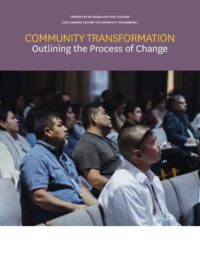Introduction: Innovation Labs for Congregational Vitality and Community Change
Imagine if a church held a gala to raise money for programs to help improve the lives of its neighbors, and everyone in the neighborhood turned their yards and driveways into a party zone to help the church. That is exactly what happened when Centro de Vida Victoriosa, a growing Pentecostal church in East Los Angeles, held a fundraiser for its nonprofit community-development corporation (CDC). Families in the houses surrounding the church set up barbecue grills along the sidewalk to prepare food for visitors to the church. Local residents even volunteered to park cars when the church’s parking lot overflowed.
“This is what community buy-in looks like,” says Rev. Frank Jackson, a contributing fellow with the USC Cecil Murray Center for Community Engagement.
Centro de Vida Victoriosa is one of six churches that the Murray Center worked with through the Community Church Transformation Project (CCTP), an intensive two-year process of accompaniment and consultation that aimed to help faith groups build strong, civic-minded organizations that can serve their communities more effectively.
CCTP builds on a decade-long series of Murray Center training programs. These “in class” programs offered a grounding in civic engagement and community development work to the leaders of hundreds of congregations and faith organizations across Greater Los Angeles.
In the low- to moderate-income communities in which the Murray Center’s partner congregations work, faith groups have a tremendous amount of social capital and can play a significant role in responding to issues such as economic inequality, racism and violence. Alumni of the Murray Center’s training programs have launched or expanded many projects, from after-school sports and feeding programs for at-risk youth to financial literacy initiatives tailored for the needs of particular communities.
Yet, during its ten years of instruction, the Murray Center team found that the capacity to transform ideas into fundable and successful programs was rare, and often required more than classroom knowledge. CCTP allowed the team to work as on-site consultants rather than as classroom instructors with six congregations that were poised to do transformative work for their communities. Over the course of the project, the Murray Center helped these faith groups become learning organizations, capable of an ongoing process of reflection that would enhance their prospects for success. This consultative role required the Murray Center team to accompany the organizations’ leaders as they learned to think critically about their goals and assess the needs of their congregations, organizations and communities.
The following report—geared for anyone who seeks to transform communities, from congregants to faith leaders to funders—shares the process, challenges and lessons of the project. We will introduce the six participating congregations, explain how a church can structure its community development ministry and describe the process that each CDC went through during the project. We call this process the “Whitlock Method,” for Rev. Mark Whitlock, former executive director of the Murray Center and the lead consultant for the project. Finally, we discuss some of the challenges that congregations can face in their community development efforts and offer recommendations for organizations and funders.
If an organization commits to this process of ongoing learning, it can also produce the goodwill and vitality that Centro de Vida Victoriosa has created within and beyond the four walls of the church.
Click here to download the full report.
This report and the Community Church Transformation Project were made possible by grants from the Weingart Foundation and Wells Fargo.
Nalika Gajaweera was a senior research analyst with the USC Center for Religion and Civic Culture through 2023.
Nick Street was a senior writer with the USC Center for Religion and Civic Culture.
